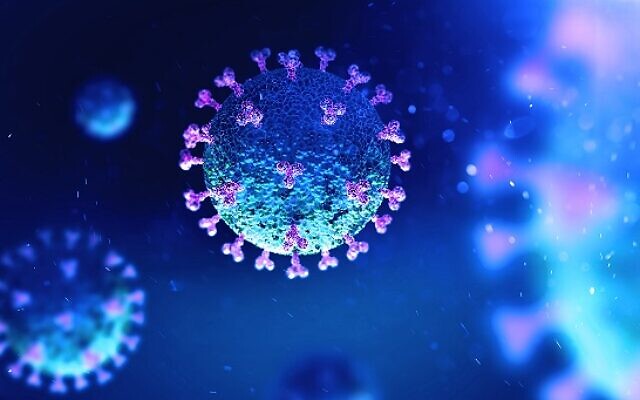Infectious Disease Expert on Latest COVID-19 Variant
According to Dr. Richard Prokesch, “Unfortunately, COVID-19 is not going away as we all hoped, and many are pretending by going back to pre-COVID behaviors."
Robyn Spizman Gerson is a New York Times best-selling author of many books, including “When Words Matter Most.” She is also a communications professional and well-known media personality, having appeared often locally on “Atlanta and Company” and nationally on NBC’s “Today” show. For more information go to www.robynspizman.com.
Perhaps you’re one of the fortunate few who has outrun COVID-19. Most likely, though, you’re one of the many now getting the new strain, whether you’re a-symptomatic or totally under the weather.
According to Dr. Richard Prokesch, a highly respected infectious disease expert, “Unfortunately, COVID-19 is not going away as we all hoped, and many are pretending by going back to pre-COVID behaviors. Georgia and 88 percent of the USA are seeing increased numbers of infected persons once again, a significant rise in hospitalizations and we are starting to see some increase in ICU admissions. It is not far-fetched to believe at this point that a good number of the population will get or have gotten infected with COVID-19, although many have been essentially asymptomatic.”
With schools opening again, Prokesch finds it concerning that precautions have been reduced, as COVID-19 is very prevalent in the community. He advises continued masking, although he does not think that it will be widely accepted. As with any transmissible infection, the basics of handwashing, good personal hygiene and cleaning are of paramount importance.
Can you explain the difference between the many variants?
Prokesch: One of the ways microorganisms survive in the environment is by mutating to avoid existing antibiotic treatments or environmental changes. COVID-19 has had multiple mutations over the span of the pandemic and very likely will continue to do so. The BA-5 variant is now the most prevalent mutation. It is extremely contagious, but all-in-all results in mild symptoms to no symptoms in most persons. The most common symptoms of BA-5 seem to be a sore throat and fatigue as opposed to the respiratory symptoms seen with previous strains. However, some people are still getting significantly sick with BA-5, with the resultant boost in admissions to hospitals as previously mentioned. Immunocompromised and unvaccinated patients remain the highest risks but we are seeing severe disease occasionally in those that are vaccinated or have had previous COVID-19 infection. Full vaccination still greatly decreases the chances of getting severe disease.

What should you do if a family member becomes symptomatic?
Prokesch: If a family member becomes symptomatic with COVID-19, they should isolate by at least masking from other family members for 5 days following the onset of their symptoms. If they are asymptomatic and the other family members are fully vaccinated, isolation is not necessary, but I would advise masking. For those infected with COVID-19, the protocol has not changed. The CDC recommends isolation of symptomatic persons for 5 days after the onset of symptoms or from testing positive. They also recommend masking for a total of 10 days, post the onset of symptoms. Fully vaccinated people that are asymptomatic but test positive do not need to isolate but should mask for at least 5 and preferably 10 days.
What do people need to know about reinfection?
Prokesch: If you are exposed to COVID and fully immunized you do not need to quarantine but should be watching closely for symptoms such as a sore throat, nasal congestion, fever, fatigue, etc. You should wear a mask and if possible, test in 5 days or so after the exposure. You should not travel 10 days after exposure if possible and if you must travel, definitely mask.
Tell us about COVID and young children.
Prokesch: Parents of young children, especially unvaccinated children, should continue to act as if the pandemic is still on-going (which it is). They should avoid crowds, especially indoors, and leave the young children home as much as possible. The children’s hospital in Atlanta has seen an increase in serious COVID-19 cases in the 3-month-and-under age group, which was not seen previously. As best we can tell, children that have been vaccinated are acting like the immunized adults with reduction in infections and, if infected, less severe symptoms.
How long does your immunity last if you’ve gotten COVID?
Prokesch: It is felt that if you are infected with COVID-19 you are likely immune to getting it again for 3-6 months, although that has not universally been the case with the newer highly contagious variants. More observation will be needed to know for sure. Lately, I have seen numerous persons contracting COVID-19 when traveling. Again, I feel that is because of the laxity in precautions. Some of my flight attendant patients have related stories of passengers being ridiculed on a flight for wearing a mask. I would highly recommend continued masking in the airport and on the plane. You definitely can be an asymptomatic carrier of COVID-19 and transmit it, although the frequency of this happening is very difficult to study so it is not really known how often this happens. It is not clear if there are super spreaders at this point.
How does the drug Paxlovid, which is being prescribed for some people, work?
Prokesch: Paxlovid is an antiviral medication that can be thought of in a way like Tamiflu is to influenza. Studies have shown at least an 89 percent decrease in hospitalizations and deaths in those who were studied after taking it, predominantly immunocompromised patients or those older than 65. Currently, it is only approved for high-risk patients: the immunocompromised and people over 65 years old, but I think that was done because of the concern that there would not be enough drug to treat everyone that became COVID-19 infected. Speaking to many of the pharmacists in the Atlanta area, there is a lot of Paxlovid currently available and I am starting to believe that it should be given to anyone with moderate-severe symptoms after infection. Some people who have taken Paxlovid for the recommended five-day course have had a rebound of their COVID-19 symptoms, with President Biden being the most famous example. This phenomenon is currently being studied and not completely understood, but the current recommendations are to restart the five-day isolation period from the new onset of symptoms.
On a final note, Prokesch says, “I personally have continued to take precautions with masking in situations where there are crowds, especially indoors. Whereas I had been not wearing a mask quite as much as I did previously, with the rise in the community again I have gone back to wearing a mask, often. Also, it is important to remain vaccinated getting boosters in a timely manner. I suspect that there will be new boosters available in the future with enhanced activity versus the newer variants.”
Visit www.cdc.gov for up-to-date information regarding COVID-19.




comments